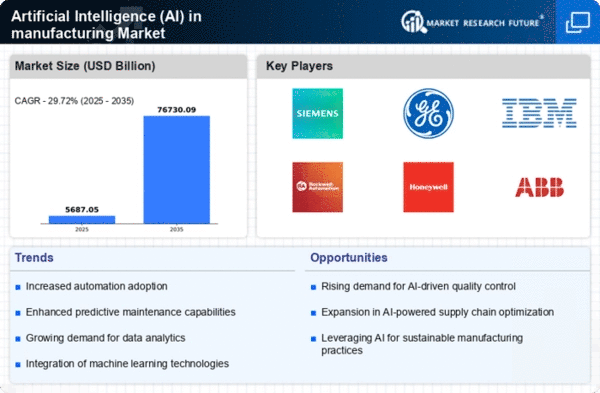Top Industry Leaders in the Artificial Intelligence (AI) in manufacturing Market
Competitive Landscape of AI in Manufacturing
The manufacturing sector is undergoing a paradigm shift, driven by the rapid integration of Artificial Intelligence (AI). This tech infusion promises profound efficiency gains, optimized production lines, and agile decision-making, making it a battlefield for established giants and agile startups alike. Let's delve into the competitive landscape of AI in manufacturing, exploring key players, market dynamics, and future trends.
Key Players:
- Nvidia Corporation
- Intel, Inc.
- IBM Corporation
- Siemens AG
- General Electric company
- Google, Inc.
- Microsoft Corporation
- Amazon Web Services
- Bosch
- Rockwell Automation
- Cisco Systems
- SAP SE
- Foxconn
Strategies and Market Share Analysis:
- Full-Stack Solutions: Leading players are vying for comprehensive AI platform dominance, offering a suite of tools addressing diverse needs, from data acquisition and analysis to process optimization and predictive maintenance. Market share in this segment hinges on the breadth and depth of functionalities, seamless integration with existing systems, and robust data security.
- Vertical Specialization: Recognizing the unique challenges of different manufacturing sectors, AI specialists are focusing on vertical expertise. Companies like Visiativ in aerospace and Strata in food and beverage provide tailored AI solutions that address specific pain points and regulatory requirements, carving out significant niche market shares.
- Ecosystem Partnerships: Collaboration is key to success. Established players are partnering with startups and technology vendors to broaden their offerings and access cutting-edge AI algorithms. Open platforms and API integrations are crucial for fostering a collaborative ecosystem and attracting diverse user bases.
New and Emerging Players:
- Edge Computing: Companies like NVIDIA and FogHorn Systems are driving the adoption of edge computing solutions, bringing AI processing closer to the factory floor. This real-time data analysis enables faster decision-making and reduces latency, particularly in geographically dispersed or automated facilities.
- AI-powered Robotics: The fusion of AI and robotics is creating intelligent machines capable of autonomous learning and adaptation. Companies like Boston Dynamics and Soft Robotics are developing robots that can handle complex tasks, collaborate with human workers, and operate in dynamic environments, transforming automation possibilities.
- Hyper-personalization: AI-powered platforms like Tulip and 3DEXPERIENCE are enabling hyper-personalization of manufacturing processes. These platforms adapt production lines to individual product variations, minimizing waste and optimizing resource utilization, particularly in mass customization scenarios.
Investment Trends:
- Cloud-based Solutions: The shift towards cloud-based AI platforms is evident, with manufacturers seeking scalable, accessible solutions that minimize upfront infrastructure costs. Companies are investing heavily in cloud deployments and expanding edge computing capabilities to cater to diverse operational needs.
- Talent Acquisition: Attracting and retaining AI talent is critical. Leading players are establishing research labs, engaging in academic partnerships, and offering competitive compensation packages to secure the expertise necessary for continued innovation and development.
- Data Partnerships: Data is the lifeblood of AI. Companies are forging partnerships with data providers and sensor manufacturers to access diverse and high-quality industrial data.
January 2024
The AI revolution in manufacturing continues to heat up, with exciting developments and major milestones being announced almost daily. Here's a snapshot of the latest news and updates, all dated January 2024 and sourced from reputable publications:
Jan 4, 2024:
Industry giants Siemens and NVIDIA announced a strategic partnership to develop and deploy integrated AI solutions for the industrial sector. This collaboration will leverage NVIDIA's cutting-edge GPUs and AI software with Siemens' MindSphere industrial IoT platform, aiming to accelerate AI adoption across various manufacturing segments.
Jan 5, 2024:
Automotive giant Ford announced a $1 billion investment in Redwood Materials, an AI-powered startup specializing in battery recycling and reuse. This strategic move aims to secure a stable supply of critical materials for Ford's growing electric vehicle (EV) production and leverage Redwood's AI expertise to optimize battery recycling processes.
Jan 3, 2024:
A new AI-based quality control system developed by C3.ai was deployed at a major aerospace manufacturer, showing impressive results. The system, utilizing computer vision and deep learning algorithms, achieved a 99% accuracy rate in detecting defects on production lines, significantly reducing waste and improving product quality.










